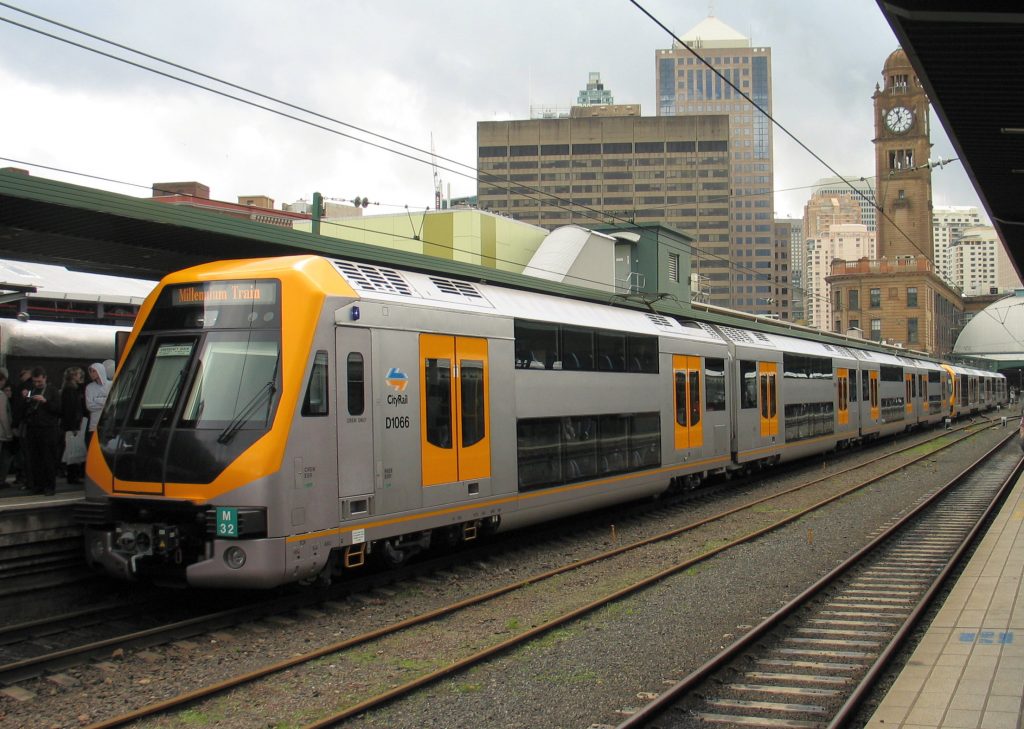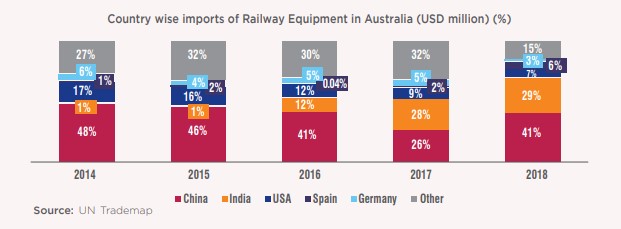Focus Sectors
Railways

Synopsis
Indian Railways is the world’s largest commercial enterprise in terms
of number of employees. It carries close to 1.2 billion tonnes of
freight per annum, as well as over 23 million passengers.
The large passenger traffic and the Government’s Make in India
initiative has led the country to develop world-class expertise in
manufacturing rails, sleepers, signaling equipment, metro coaches,
locomotives, etc.
The following opportunities can be explored in this sector:
- Increasing investments from Australia into India’s rail infrastructure projects
- Utilizing Indian manufacturing capability in railway components for railway projects in Australia
- Adopting best practices from Australian rail transportation for heavy haul
India has one of the world’s largest railway networks spread across 115,000 km.386 Indian railways carry ~8.2 billion passengers and ~1.2 billion tonnes of freight per annum.387 However, India faces the need to upgrade and expand its railway infrastructure and network to achieve sustained economic growth and meet the needs of its growing population.
Increasing Australian investments into railway infrastructure in India
With a view to support the growth in demand, the Indian government is focused on increasing investments in the rail sector through investor-friendly policies and introducing new railway projects. The government has permitted 100% FDI in railway infrastructure and has announced the development of four new dedicated freight corridors and six new high-speed corridors with a total projected investment of USD 158 billion. The Indian Railways is looking to electrify the entire network by 2025. 700 stations will be fed with solar power in the medium term.
Australian private corporations and infrastructure focused funds can therefore explore investment opportunities in India’s railway infrastructure. The government has also taken the decision to allow 150 trains to be operated by private operators. It is envisaged that the private train operators will be permitted to have their own rolling stocks which will not only encourage wide participation but also adoption of global best practices. India should encourage private operators from Australia to explore this opportunity. Further, the government also plans to develop 110 new railway stations under the public-private partnership model, thus presenting investment opportunities for Australia.
Exporting Railway components to Australia from India
Indian railways have huge passenger traffic that has led to the country developing expertise in manufacturing rails, sleepers, signaling equipment, metro coaches, locomotives, etc. (known as rolling stock). Large cities across the country have also invested in state-of-the-art technologies to increase reliability and efficiency of urban rail systems. This has led to the emergence of metro projects across various Indian cities. In addition, the Government’s focus on improving public transportation in the country has also resulted in the development of ancillary industries such as railway equipment and spare parts industry. Metro coaches and other parts, including battery boxes, window glasses, bogie frames, brake blocks, propulsion systems and vacuum circuit breakers are now being indigenously manufactured in India.388
Global companies, such as Alstom, Bombardier and Hyundai Rotem have already set up manufacturing plants in India. The China Railway Rolling Stock Corporation (CRRC) has also entered into an MoU with the Government of Maharashtra for setting up a manufacturing facility in the Multimodal International Cargo Hub and Airport at Nagpur (MIHAN).389
India thus has local manufacturing capabilities that can be leveraged to supply railway components to meet domestic as well as international requirements.
In recent years, railway exports to Australia have been on the rise. In 2016-17, India’s railway exports to Australia were USD 167.4 million and in 2017-18, the exports increased to USD 351.3 million on account of export of metro coaches by Alstom to Australia.390
In addition, Bombardier has also invested 33 million Euros (USD 35.77 million) in its Indian manufacturing facility and has orders to export 450 metro rail coaches to Australia and components to Brazil, Australia and Saudi Arabia. The Quebec-based company has a manufacturing plant in the Gujarat in Western India and a transportation engineering services
center in Gurgaon, near New Delhi.391
Australia has several on-going as well as planned railway projects that offer export opportunities for Indian railway equipment manufacturers.
Some of Australia’s current rail projects include:392
- Inland Rail connecting Melbourne to Brisbane (AUD 9.3 billion (USD 6.2 billion))
- Sydney Metro (NSW), (AUD 12 billion (USD 8 billion))
- Melbourne Metro Tunnel (VIC), (AUD 11 billion (USD 7.4 billion))
- Melbourne Airport Rail Link (VIC), (AUD 5 billion (USD 3.4 billion))
Australia is a net importer of railway equipment. While the share of Indian exports to Australia is on the rise, China remains the largest source of imports for railway equipment to Australia (Approximately 41% of total imports in 2018).393

Railway Equipment thus presents a promising opportunity for Indian exporters to Australia. This can be carried out through technical collaborations with railway equipment manufacturers in Australia as well as by consolidating in-house manufacturing capabilities of Indian companies. At a policy level, the Ministry of Railways in India, in partnership with Indian Government undertakings such as RITES and IRCON, can encourage technical partnerships with their
Australian counterparts.
Australian based company Aurizon is a well-established rail freight operator, known for its modernized technology and logistical solutions in the transportation of bulky commodities. This company has specialized expertise in rail design, engineering, construction, etc. Thus, India can seek Australia’s expertise on railway haulage via collaborations with companies like Aurizon to increase the reliability and efficiency of its current rail haulage systems. Furthermore, the Institute of Railway Technology (IRT) in Monash University has been developing Unmanned Autonomous Systems (UAS), commonly known as ‘drones’, for autonomous inspections of railway tracks. The Indian government can use Australia’s expertise in conducting such automated inspections to reduce frequency of rail accidents.394
Recommendations
- Technical collaborations between railway equipment manufacturers in Australia and India should be encouraged. The Ministry of Railways, Government of India, in partnership with Indian Government undertakings such as RITES and IRCON, can facilitate such technical partnerships with their Australian counterparts
- On the lines of Alstom and Bombardier, the Government of India should encourage other Australian companies to evaluate India as a low-cost manufacturing location for rail infrastructure
- Encourage Australian companies to invest in upcoming railway infrastructure projects in India
386 Invest India
387 Indian railways yearbook, 2017-2018
388 Global Rail Components Market 2018-2024, 2018, Mordor Intelligence
389 India to make coaches for some of the world’s biggest metro projects, 2017, Economic Times
390 Trademap, HS Code 86
391 Complete list of Australian infrastructure projects, 2019
392 Trademap
393 10-member Australian Rail Delegation visits India, 2019, Austrade
394 Remote track inspections using drones, Infrastructure Magazine
Next topic: